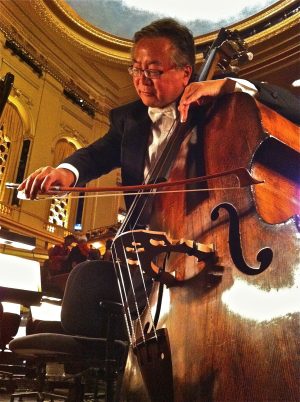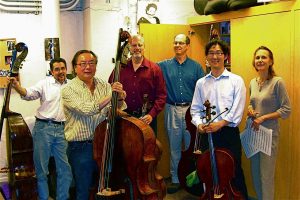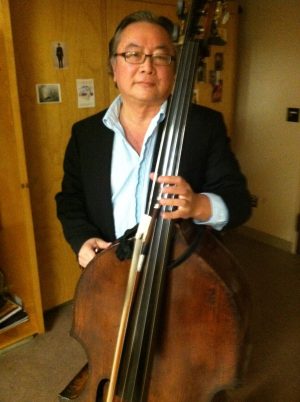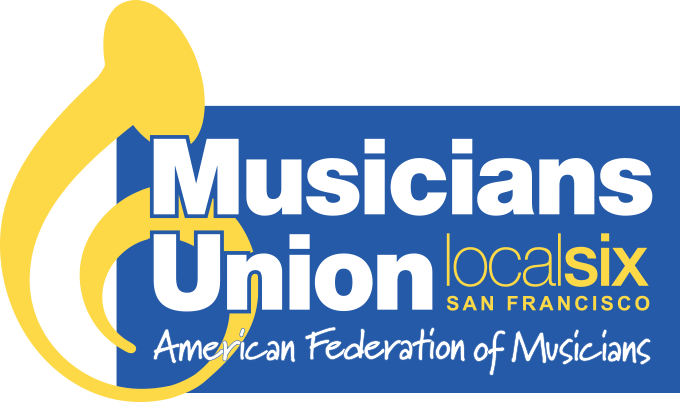Shinji Eshima: “Full Circle”
by Alex Walsh

photo by Mark Drury
Shinji Eshima is a double-bassist in the San Francisco Ballet (Associate Principal) and San Francisco Opera Orchestras. He is on the faculty at San Francisco State University and the San Francisco Conservatory of Music. An award-winning composer, he has written for a variety of venues including theater, documentary film, chamber music, opera, ballet, and has even written Buddhist hymns.
Shinji was born in Berkeley, and attended public school there. For his contribution to the arts, the city of Berkeley named a day after him at a recent City Council meeting. “I told the council I was very proud to receive the award, and that it was entirely public education that made this possible. Music in the schools produces a greater and more robust world. You have better thinkers, better contributors, and this award acknowledges that. The value of that cannot be underestimated.”
As a child, Shinji took piano lessons, which he says is common in Japanese households. At nine years old, he won the Junior Bach Festival. At a later competition, he had a memory slip during the winner’s recital—a turning point. “I went to the keyboard, and I thought, ‘Oh God, 88 keys, which one do I press first?’ That changed my life.”
In high school, he switched to the bass. His first string teacher was the late Anne Crowden. “I thought it would be easier because there was only one line to do at a time.”
Shinji was proud to attend Berkeley High. “We did Mahler’s 2nd Symphony, over a hundred people, with full chorus and soloists—and the West Coast premiere of Britten’s War Requiem. That’s how much music was valued at the time. It was an amazing thing to experience as a kid.” When the conductor, Bill Elliott, suggested that Shinji consider the bass a career, Shinji thought he was joking. “I never thought of it as a career until I got to college. It was just nice to play in an orchestra. It was more of a social thing back then.” His graduating class included Peter Shelton, former assistant principal cellist at the San Francisco Symphony, Ben Simon, now conductor of the San Francisco Chamber Orchestra, and Doris Fukawa, who is now director of the Crowden School in Berkeley.
Shinji received a tuition scholarship to Stanford, where he assumed he would become an engineer. After meeting with a student advisor and realizing the course work involved, he switched to music. At Stanford, he studied bass with Charles Siani and played in the orchestra. He graduated a year early with honors, and then went on to Julliard, where he studied with David Walter.
In 1979, after receiving his Masters, Shinji returned to the Bay Area. He played with the Marin Symphony, and won an audition for the San Jose Symphony. In 1980, when Davies Hall opened, it created vacancies in both the SF Symphony and the SF Opera Orchestra; the musicians were required to choose one or the other. Shinji auditioned and was offered both positions. “At that time, the Opera and Symphony paid the same amount, but the Opera was half the time, so I said, okay, I’ll do the Opera.”
To his dismay, he found that he hated Opera music. “I didn’t know what I was getting into. My first rehearsal was Verdi, and I thought, ‘this sounds like circus music—Oompa oompa.’ I was perplexed. It took me a long time to learn the irony in the music. And it took a long time for me to appreciate singers. For ten years, I thought the singing was distracting to the music! I’ve since grown to prefer it. It doesn’t feel like a complete work unless it embodies theater as well.”
By the 1990s, Shinji was in love with opera. “I remember Calvin Simmons, the late conductor of the Oakland Symphony, came and conducted Lady Macbeth and just blew the house down. At that time, we had amazing singers—Caballe was singing. When I heard her voice, even though she’s 300 pounds, I just fell in love. I can’t believe how she can float a note. It’s a sound that just goes straight to your heart.”
“In the Arts, there’s sometimes a fine line between appreciation and falling in love, because the highs that you can get from a performance can be really thrilling. It’s intoxicating. I think that’s the reason why people are willing to hear something over and over again, the live music experience. There’s nothing like it. It grabs you from the inside.”
Shinji has a great appreciation for the Nutcracker, and can’t think of another show he would want to play 1000 times. “It has provided me with a house over the years, and I’m just one musician. When you think about the dancers and production crews, and all the different companies doing it all over the world, Tchaikovsky is like a whole country’s economy. Also, because of all the young kids, you get a whole new audience every year. For them, it’s a new experience. You get a new feeling every year.”
In the SF Ballet Orchestra, Shinji plays a unique bass. Made by Plumerel, it had its birth in the Paris Ballet in 1843, and appears in one of Degas’ famous ballet paintings. Shinji’s teacher, David Walter, played it in the NYC Ballet, and Shinji got it just in time for the 75th anniversary of the SF Ballet.
In 2010, Shinji’s life took a surprising turn when Yuri Possokhov, the resident choreographer and former principal dancer for the SF Ballet, asked him if he would be interested in collaborating on a ballet based on a Japanese story. Shinji jumped at the chance. “I’ve been composing now for 20 years, mainly chamber music for friends. RAkU was written for my friends in the ballet orchestra. The solos are written for specific people. I’ve been playing with these guys for 30 years, so I know what they’re able to do.”
Shinji said the bassoon solo he wrote for Rufus Olivier was very difficult. “He taught me all these ways to play the bassoon, and so I incorporated all of them in his solo. A few of us play poker during the breaks. During the first rehearsal, Rufus played his solo, and the guy who sits next to him leaned over and said – ‘You should have let him win.’ It’s a remark like that that makes it all worth it. There’s a camaraderie, a sense of humor.” Shinji also wrote a cello solo for David Kadarauch, who was retiring from the orchestra, and a fourth horn solo for Bill Klingelhoffer, who taught him a lot about the horn.

with members of the SF Ballet Orchestra:
Steve D’Amico, Shinji Eshima, David Kadarauch,
Jon Lancelle, Eric Sung, and Nora Pirquet.
The process of learning how to compose for ballet, and collaborate with Yuri, was a challenge. “Writing is very different to ballet than it is to something abstract. The dancers need different counts, different rhythms and tempos, to enable them to do what they do. Yuri really insisted on what he envisioned for the work. It was a lot of give and take.” Shinji worked out his ideas on the Steinway piano underneath the stage in the Opera House, his favorite place in the whole building. He recorded hundreds of different versions on synthesizer until he got it right.
For the premier, Shinji was able to watch the first three shows from the audience. After that, he was back in the pit, sight reading his own score. “It was the thrill of a lifetime! And the fact that it was successful is the icing on the cake.” In the fall of 2011, the SF Ballet had a successful tour to Los Angeles, where they performed RAkU with the Pacific Symphony. A unique feature of RAkU is its incorporation of Buddhist chanting. Through one of his students, Shinji made a connection with the San Francisco Zen Center, which provided monks to chant during the performances. “They chanted the most beautiful text. It means, ‘We’re here listening to your suffering, and we’re chanting for your well being’.”
Shinji’s family is Buddhist. “I have uncles who were bishops in Hawaii and Canada. My grandmother was the first woman to be ordained as a Buddhist minister. She started the Buddhist Study Center in Berkeley. That was where Alan Watts and Gary Snyder and Philip Whalen had their roots in studying Buddhism here. I have that in my family background. I haven’t practiced it, it’s just sort of come to me lately. People have always said that my music sounds Japanese. As much as I’ve tried to resist that, it just unconsciously comes through I guess.”
The score for RAkU was recorded at Skywalker. Shinji says Steve D’Amico and Peter Wahrhaftig were instrumental in convincing the SF Ballet administration that it was a viable project. “It was basically not going to happen without the efforts of the orchestra. They took a vote and agreed to do it, and the result is unbelievable. The SF Ballet is producing it and releasing it. The proceeds go to them. The union helped out a lot by approving the circumstances to allow the recording to happen. It’s such a dream to be at Skywalker and have an orchestra play your work. I can’t thank everyone enough.”

Shinji continues to teach, perform, and compose. He has students performing all over the world—in the SF Symphony, the London Philharmonia, the Montreal Symphony, and the latest, the Utah Symphony. For the International Bass Convention held at SF State University last summer, he served on the organizing and host committees, as a performer and also as a judge of the orchestral competition. More than 1200 bassists participated. “The prize was named after the late Charles Siani. The winner of this competition was supposed to get a week as a paid player in the SF Symphony. I’m told he just won the Cleveland Orchestra job, which tells of the high quality we had here.”
Last summer, Shinji wrote a piece for Bay Brass, and is currently writing a new one. In the Fall, he had a premiere of a chamber piece in New York for the National Dance Theater, directed by Jacques D’Amboise. For the 50th anniversary of the Zen center, he was asked to compose a piece in collaboration with poet Gary Snyder, one of the first students to come to his grandmother’s Buddhist Study Center. The San Francisco Ballet will perform RAkU again this spring.
“And, I just received my latest union benefit–my dues are going down as a 35-year member. I can’t believe it’s been that long. It still feels like yesterday.”
